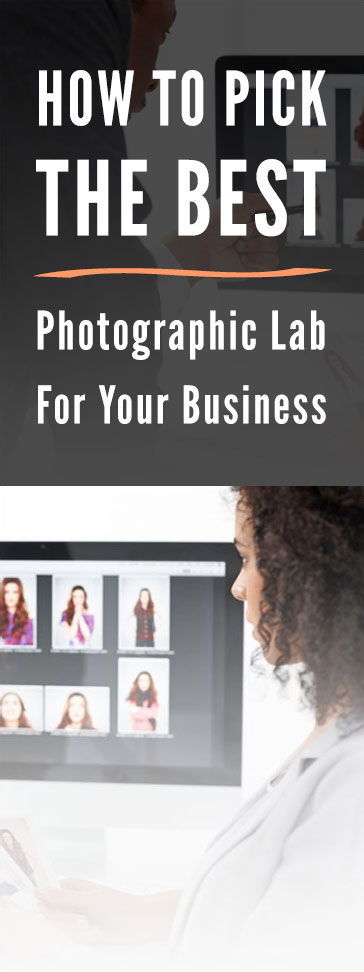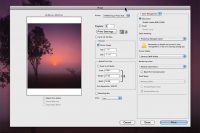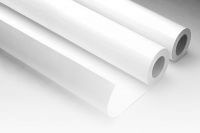Starting a photography business isn’t easy, especially if you’ve no prior experience in the industry which can in the beginning make decisions all that more difficult.
One of the hurdles that you’ll have to overcome is finding a reputable photographic lab to outsource the printing and finishing of our photography.

If you are lucky enough to be located near or within a city you’ll have access to numerous photographic labs, but even if you aren’t the internet has has given rise to online ordering and delivery from the comfort of your own home.
Why Is It Important To Make Sure You Choose The Right Photographic Lab?
Unfortunately, all photographic labs aren’t made equal and after working in the professional photographic lab industry for over 5 years, I’ve had the opportunity to see the inner workings of good photographic labs and bad ones.
It’s important that you make the right decision in the beginning, because your businesses reputation is dependant on the quality and consistency of services supplied by these companies.
Now of course you may consider buying a portable inkjet printer and doing all of your printing in-house, but for those of you who aren’t ready for this type of investment you’ll need to outsource your work and unfortunately there are a lot of cowboys in the marketplace, especially when it comes to online inkjet printing which is why you need to be a little bit cautious.
Create A List Of Criteria
Taking into account the requirements of your photography business you need to come up with a list of criteria from which you can assess each of your local and not so local photographic labs.
With this list you’ll be able to accurately assess which labs will best suit your needs as a photographer and deliver the highest quality product to take to market.
Your list of criteria should include a series of questions that when answered will establish a means of rating each photographic lab accordingly (highest to lowest).
Ten Questions To Get Your Started:
1. ) What product and service range do they offer?
This is an interesting question because the answer really depends on your business model. If you are just getting started you may not have an ideal product range in mind and therefore I recommend that you focus on only offering a limited number of unique high quality products to clients.
By reducing your product range you will in effect increase your sales conversion because it has been proven that if you give your clients too many options they will become overwhelmed by choice which leads to indecision and the lost of a potential sale.
Another side effect of focusing on a small product range is that it becomes easier to increase the efficiency by systemizing your workflow processes and this is because you have less variables to manage.
Photographic labs that have a large range of products and services can be very handy especially if they stay on the cutting-edge of technology, continually innovating and introducing products and services to the market that may be of benefit to your business. But with that said, quantity does not equal quality.
2. ) Does the photographic lab provided finishing services?
If you wish to save time, effort and potentially money you may want to consider choosing a photographic lab that offers finishing services (like mounting and framing) which will avoid you having to deal with two separate businesses.
Now remember, if you choose to go down this path you’ll need to keep in mind that quality is everything and a lab that may be great at printing doesn’t necessarily mean that they’re going to be good at finishing. On average, labs will only stock a small range of framing materials, so you might need to negotiate in order to get exactly what you want if they don’t have it in stock.
3. ) Does the photographic lab have an online ordering system?
In today’s day and age it’s become so important for photographic labs to offer some form of online image upload, ordering and payment processing… If your lab doesn’t offer these basic services I would definitely re-evaluate your options as the time saved online translates into extra money in your pocket.
If photographic labs aren’t willing to stay up to date with technology in this area of their business, then chances are they’re not on the cutting-edge of technology throughout the rest of their business either…
Most photographic labs will be using ROES software to implement this functionality within their business so switching from one lab to another usually won’t be an issue as the software platform with be the same and the only difference will be their what they offer in terms of products and services.
4. ) How reasonably priced are the products and services on offer with respect to other competitors in the industry?
As a business owner it’s well worth doing your homework and trying to get the best deal possible for your business without compromising on quality.
If you are committed to producing a substantial volume of ongoing business for your photographic lab you may be able to come to an mutual understanding and receive a loyalty discount. It’s never too late to ask and don’t be scared to take your work elsewhere if your negotiation goes south.
5. ) Does the photographic lab practice colour management?
I can’t stress this enough, make certain that the photographic lab practices at least basic colour management principles. Colour management isn’t a one way street, so not only do they have to be implementing colour management on their end, ensure that they also provide you with printer and paper output profiles. These colour profiles will help you achieve better results through implementing techniques like “soft proofing” when editing your photos.
What if they don’t provide colour output profiles, then if this lab is your only option in terms of a local provider, then you’ll need to submit your own color charts for testing, along with a small color chart with each of your print runs to monitor quality.
6. ) In terms of quality and consistency, how would you rate the photographic lab on a scale of one to ten?
Obviously, in order to review the quality of a lab you’ll need to get work printed ( preferably on a several occasions…) that you can then evaluate, however establishing which printers, papers and finishing products they employ as part of their photographic processes will give you a reasonable idea of what you could come to expect prior to purchasing any prints.
When you start comparing a chemical process to that of an inkjet process, along with different paper types and finishing methods the quality of your results will vary considerably due to the different characteristics of each element in the production process.
What I hope you take away from this point is that you need to do your own research in advance to understand not only the process behind how your finished artwork is produced, but more importantly what products you should be utilize to deliver the best possible result for your clients.
7. ) How efficient is the photographic lab at delivering work on time?
Unfortunately you won’t find out the answer to this question until you’ve put through at least 3 or 4 jobs, so what I recommend is that you submit a job and inform the lab that it is urgent (even though it may not be…) and test out whether or not they will go out of their way to meet your deadline.
Even though this is just a test, it’ll will give you a good indication of how this particular photographic lab will perform when push comes to shove, especially when you’re under the pump. If they don’t take kindly to urgent jobs then the lab in question may not be the best solution for you and your business.
Of course this is all relative to how you intended on running your photography business, so if speed is important to your business model then please keep this in mind.
So, what do you do if there is an issue with your photographic lab and they are unable to deliver your work on time?
In business you always need to have a contingency plan to cover yourself in case of emergencies and outsourcing is no different. That’s why I recommend serious photographers outsource their work to a couple of photographic labs, reducing the risk of upsetting your own clients because of circumstances that you have no control over. You’ll have one favourite lab and you’ll have another waiting in the wings for emergencies. In order for your contingency plan to be effective you’ll need to have a separate colour management and file format procedure for each lab, thus ensuring no delays.
8. ) If required, will the photographic lab accommodate custom requests or tailored solutions for your business?
As a business owner, you’ll quickly learn that your time is extremely valuable and extremely limited, so outsourcing your menial tasks is not only a great idea, but a profitable one. Why? Because it’ll save you time that can then be spent on the important aspects of your business like getting clients, conducting photo shoots and keeping your existing clients happy that make you the real money.
Good photographic labs will happily accommodate your custom requests for a price of course and all you need to do negotiate the terms of your agreement.
9. ) How long has the photographic lab been in business?
The reality is reputable photographic labs have usually been in business for an extended period of time and the simple fact that they’re still in business means that they must be doing something right, which is a good sign.
Now, what if they haven’t been in business very long? Well, this is where you’ll need to be very cautious because in all honesty, it’s become extremely accessible and relatively inexpensive to start an online printing business which can be run completely out of your home. This is primarily due to online commerce and the reduced cost of inkjet printers in comparison to purchasing an LED photographic printer and chemical processor which would easily set you back hundreds of thousands of dollars.
These small startups can present a serious problem for photographers when it comes to managing the growth of your business because unfortunately there will come a time when their business bottlenecks with too much work and not enough printers capable of producing substantial volumes within a reasonable timeframe.
Ordinarily, if you’re a sole trader then this shouldn’t cause a problem, but if you intend on employing additional photographers to manage the increased demand as your business grows I would definitely reconsider and focus on a photographic lab that provides both chemical and inkjet printing services.
10. ) Does the photographic lab outsource any of it’s products and services?
Keep an eye out for photographic labs that outsource your work, I know from personal experience that some photographic labs (like other businesses) outsource products and services. Often the reason behind why labs outsource is simply because they just don’t have the technical capabilities required to produced a particular product or service in-house.
Without naming names, I knew a company that outsourced all of their inkjet prints due to the fact their own inkjet printer became obsolete which resulted in customers paying higher prices for inkjet prints because of the extra profit margin added on top of the outsourcers fee.
The easiest way to check whether or not a lab outsources is simply to request a personal tour of the lab and take note of what machinery they have onsite. If the machinery your photos are printed on isn’t onsite, the lab is either outsourcing your work or lying to you about the machinery they use to produce your prints.
Test, Test & Test
As you can see there is a lot to considered when selecting the right photographic lab for your business and unfortunately there’s no way of really knowing whether you’ve made the right choice until you’ve invested in multiple print runs to test the quality, service and support of the photographic lab. Remember to always keep your options open and this way you will avoid any unnecessary heartache in the future.













Is it a possibility that a printing lab can keep some of your work?
Even if you have a good standing relationship with your photography / printing lab, it’s definitely a possibility that your work may be compromised. It’s common place for businesses to hold onto your files for a limited period of time before deleting them… However, an individual working for the lab could easily pirate your digital photography which is why you want to make sure your metadata contains all of your copyright information in case of dispute.